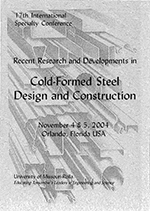Session Dates
04 Nov 2004 - 05 Nov 2004
Abstract
Stainless steel exhibits highly non-linear behaviour, and in the case of short column structural members, this can lead to substantial conservatism in the prediction of load capacity by design codes due to their use of the 0.2% proof stress as an upper limit of capacity. This paper examines the behaviour of short stainless steel stub columns in which the material follows a Ramberg-Osgood type of stress-strain law. The column length is varied to examine the effects on the load capacity when the column is subjected to varying magnitudes of combined bending and axial compression loading. The loading is applied as eccentric axial loading, with the eccentricity being positive at one end and negative at the other to produce varying moments along the column under load. Two different methods of analysis are employed, (1) the ASCE design code using a Ramberg-Osgood stress-strain law combined with a full section moment capacity within the interaction formula with nominal levels of loading eccentricity, and (2), the same approach, but using the true eccentricity with reference to the unsupported length of the columns. The results are compared with those obtained from a series of compression tests performed on cold formed stainless steel Type 304 stub columns of lipped channel cross-section for the same conditions.
Department(s)
Civil, Architectural and Environmental Engineering
Research Center/Lab(s)
Wei-Wen Yu Center for Cold-Formed Steel Structures
Meeting Name
17th International Specialty Conference on Cold-Formed Steel Structures
Publisher
University of Missouri--Rolla
Document Version
Final Version
Rights
© 2004 University of Missouri--Rolla, All rights reserved.
Document Type
Article - Conference proceedings
File Type
text
Language
English
Recommended Citation
MacDonald, M. and Rhodes, J., "Stainless Steel Stub Columns Subject to Combined Bending and Axial Loading" (2004). CCFSS Proceedings of International Specialty Conference on Cold-Formed Steel Structures (1971 - 2018). 5.
https://scholarsmine.mst.edu/isccss/17iccfss/17iccfss-session5/5
Stainless Steel Stub Columns Subject to Combined Bending and Axial Loading
Stainless steel exhibits highly non-linear behaviour, and in the case of short column structural members, this can lead to substantial conservatism in the prediction of load capacity by design codes due to their use of the 0.2% proof stress as an upper limit of capacity. This paper examines the behaviour of short stainless steel stub columns in which the material follows a Ramberg-Osgood type of stress-strain law. The column length is varied to examine the effects on the load capacity when the column is subjected to varying magnitudes of combined bending and axial compression loading. The loading is applied as eccentric axial loading, with the eccentricity being positive at one end and negative at the other to produce varying moments along the column under load. Two different methods of analysis are employed, (1) the ASCE design code using a Ramberg-Osgood stress-strain law combined with a full section moment capacity within the interaction formula with nominal levels of loading eccentricity, and (2), the same approach, but using the true eccentricity with reference to the unsupported length of the columns. The results are compared with those obtained from a series of compression tests performed on cold formed stainless steel Type 304 stub columns of lipped channel cross-section for the same conditions.



